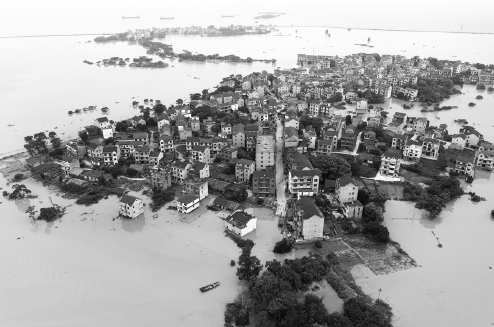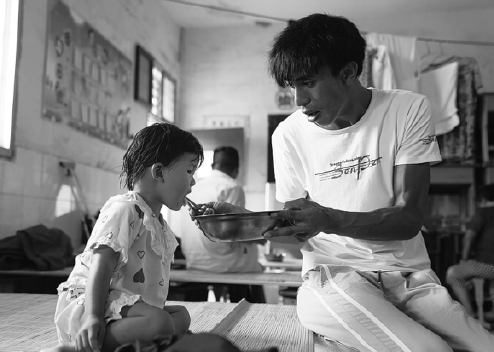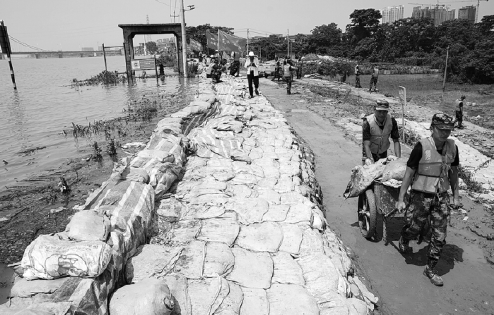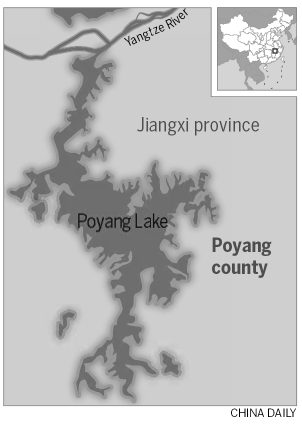FARMERS RUE LOSSES FROM DEVASTATING FLOODING
Villagers near Poyang Lake forced to evacuate





After his village near Poyang Lake in Jiangxi province was hit by ruinous flooding this month, Huang Guoqi had to abandon his home and move to a disaster relief shelter.
Huang, 50, is a farmer from Guihu, one of the villages most seriously affected by flooding in Poyang county.
On July 12, the water in China's biggest freshwater lake reached a record height of 22.6 meters, more than 3.6 meters above the warning level.
Located in the north of Jiangxi, Poyang Lake is formed from an overspill of the Yangtze River. On Tuesday, the lake covered 4,403 square kilometers, some 25 percent more than usual for this time of year. The spillover was also the worst for 10 years.
The lake's rapid encroachment, which can be seen from satellite images, was caused by continuous torrential rain and serious flooding on the Yangtze and smaller rivers, which provide water for many farming villages, including Guihu. As a result, the villages have become danger zones.
Huang plants watermelon, sugar cane and rice on his land, which can earn him about 45,000 yuan ($6,435) a year if there is no flooding.
On July 8, flooding along the Changjiang River, which flows into Poyang Lake, engulfed Guihu, leaving an 80-meter-long cavity along the embankment.
After hearing onrushing water, Huang, who was working in his watermelon field, initially hurried toward his house to move some of his belongings to the second floor. However, on sensing the danger, he realized this would be impossible, and ran for his life.
"I later discovered home appliances under the water on the ground floor, which was about 1 meter deep. I couldn't help crying, because I'd never been in such a terrible situation," Huang said.
Since July 9, he and more than 800 other villagers affected by the flooding have been staying at the relief station, set up in a primary school in Poyang, the county seat.
On July 11, Huang returned home by boat to retrieve some clothing. He lives alone at the house, which was renovated last year. His wife works in Shenzhen, Guangdong province, and his son and daughter are also away.
He said his children have phoned many times to comfort him and to tell him not to worry about possessions lost to the flooding.
Huang said he has been told the floodwaters will not subside completely until the end of next month. He is not unduly worried about his farm produce and belongings, as there is little he can do but wait.
However, what bothers him most is his son's wedding. The ceremony, due to be held at Huang's house at the end of this year, looks as though it will fall victim to the flooding. The house will also need to be renovated again once the waters subside.
To calm his nerves, Huang lit a cigarette with a lighter borrowed from a villager at the shelter, where 17 people sleep in a single classroom. Taking a gentle puff, he said he is worried that because of the flooding, he may not have enough money for the wedding.
Since the start of this year, the family has had almost no income and only has savings of 200,000 yuan, about half the cost of the wedding and other arrangements, he said.
"We thought my wife, my son and myself could earn some money this year and borrow some from my daughter and other relatives. But now everyone has been affected by the flooding, it will be difficult to borrow," he said.
Comparison with 1998
Locals are comparing the flooding in southern China with that in 1998, which killed more than 3,000 people and displaced 14 million along the Yangtze River Basin.
Since last month, continuous torrential rain has fallen in many areas of the south, and the waters of rivers, including the Yangtze, have exceeded warning levels. More than 20 million residents have been affected in 24 provincial-level areas nationwide.
This month, flooding in Jiangxi, Anhui and Hubei provinces has left 23 people dead or missing and forced the evacuation of 1.76 million. The waters also damaged 89,000 houses this month, the Ministry of Emergency Management said on Thursday.
The floods in 1998 were some of the worst since the People's Republic of China was founded in 1949.
Wu Hejiao, 62, also from Guihu, who is staying at the relief station with her husband and grandson, said those floods lasted more than a month. However, there was no relief site for the villagers, who did not have hot meals every day or sleep in areas cooled by electric fans, as they do now.
"Many people lived in simple shelters set up on high ground, which lacked showers, enough drinking water and flush toilets. In addition, we were troubled by mosquitoes and other insects.
"Now, the shelter set up at the school is very good and the local government has considered almost everything we need," she said.
Wu and her husband spent 18,000 yuan this year planting about 1 hectare of land with rice and soybean crops, thinking they could earn 60,000 yuan from the produce. However, the floodwaters have dashed their hopes.
She said that if the flooding subsides before the end of this month, it may be possible to plant more rice. If not, the losses will never be recovered and nearly all the farmers in the village will have no income.
To build their three-story home, Wu's family borrowed from relatives, repaying the money this year. However, the house is now flooded and Wu has returned home once by boat to feed 15 chickens.
"I didn't sleep at night when the floodwaters inundated the house-I just hoped things would get better. The COVID-19 pandemic also meant we had to postpone planting and other farming activities. This year will be hard for everyone in the family," she said.
While the Guihu villagers are being cared for at the shelter, disaster relief teams comprising engineers and troops from the People's Liberation Army have been busy repairing the river embankment, filling in the 80-meter cavity on Wednesday.
Serious efforts
According to a meeting of the Standing Committee of the Political Bureau of the Communist Party of China Central Committee in Beijing on Friday, while carrying out flood control and disaster relief efforts, authorities should also carefully plan reconstruction work to restore production and help people return to normal life as soon as possible. Serious efforts must be made to assist poor, flood-affected residents so that they do not fall back into poverty.
Zhang Yongyong, 51, from Longkou village, Poyang, is still living at home even though the village is engulfed by flooding, with rice fields under water up to 5 meters deep.
The flooding cut electricity and water supplies to the village, where about 300 people have decided to remain. Some villagers have been unable to contact their family members after floodwaters damaged telecommunications equipment. Longkou can only be reached by boat.
Since 2015, Zhang has rented about 20 hectares of land in the village to plant rice. This year, all his fields have been flooded, resulting in a loss of about 410,000 yuan and leaving the family 150,000 yuan in debt.
Zhang said each hectare can produce 13,500 kilograms of rice, which last year sold for 2.05 yuan per kg. He said that if there had been no flooding this year, he would have been able to make about 550,000 yuan. Much of his farming equipment, which has been left in the fields, will need repairing.
He said his wife, scared by the flooding and worried about the family's losses, was unable to sleep or eat well for several days. "I told her not to fret over the losses, as the flooding will eventually subside and we will be able to plant rice again," he said.
When he agreed to rent the land, Zhang said he had taken the possibility of flooding into consideration, so that when the waters arrived, he was well prepared mentally.
After water levels started to drop on Thursday, he cleaned the floor of his house and some personal belongings.
He even found time to smile as he discussed his losses, saying that flooding is not unusual in villages near Poyang Lake, but in the past it has only lasted two or three days. This year, the severity of the situation has caught residents by surprise.
"Planting rice is not suitable work for those who fear the floods," he said.
When the lake flooded the village on July 8, Zhang, who was working in his rice field, jumped on a tricycle to reach his house, which stands on high land.
"I only know how to plant rice, so I will continue doing this. In my experience, the waters will subside late next month. I will clear sand and stones from my field in the following months. Although this will take time and money, I need to prepare well for planting next year," he said.
By 10 am on Saturday, the water in Poyang Lake had dropped to 21.8 meters, still 2.8 meters above the warning level.
Although the water has continued to fall, the flood risk remains at the highest level, as more heavy rain is forecast for Jiangxi, according to the lake's hydrology bureau.
One thing remains clear, the locals' battle against the flooding is far from over.





Today's Top News
- Crackdown on Chinese firms politically driven
- Mainland denounces Taiwan-US trade deal as 'sellout pact'
- Steering Sino-US relations in the right direction
- Retired judges lend skills to 'silver-haired mediation'
- Are you ready for robots to roam your streets?
- Good start for new five-year plan stressed


























